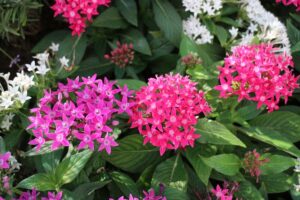Growing Pentas Indoor Guide

Pentas are beautiful flowering plants also known as the Egyptian star pentas are native to tropical southern Africa, the Arabian Peninsula, Comoros, and Madagascar. This tropical woody plant is considered a perennial or a subshrub. In its native habitat pentas can grow to be 3-6 ‘ tall, when grown and cared for in outdoor garden settings pentas will attract bees, butterflies, and hummingbirds but are known to be deer and rabbit resistant.
Pentas are herbaceous perennials that are treated as annuals in north Florida, these garden beauties are common for being grown outdoors but can pentas be grown indoors? The answer to that question depends on several factors, once these requirements are met it is possible to have some success with growing pentas in an indoor living environment.
Steps to Growing Pentas Indoors
Lighting Conditions
Pentas love the full sun therefore it’s important if seeking to install pentas indoors, place them in an area indoors that gets the most sunlight which is either a south or west-facing window. It’s important to keep this in mind because pentas that are grown indoors need all the sunlight light that’s available.
The Container Size
The choice of the container is so important, the size should be considered, for example, a 3-gallon container should accommodate two pentas while a five or seven-gallon pot can comfortably fit four to five penta plants. The container should have drain holes for water drainage to discourage root rot, the container or pot can be plastic because it’s a known fact that plastic pots hold more water than clay pots.
Pentas Soil Type
A good potting mix that has good drainage is ideal for your potted pentas, adding some organic matter will go a long way in further helping pentas to thrive indoors. Two potting mixture that will work well is Miracle-Gro Potting Mix or Burpee Organic Potting Mix.
Watering Methods
Pentas don’t like wet feet avoid overwatering pentas will lead to root rot, the soil should be moist not water-saturated or waterlogged. When applying water avoid the water from wetting the leaves because if the leaves are wet consistently will encourage the development of brown spots.
Fertilizing Methods
During the growing season which is spring through summer apply a slow-release fertilizer such as Osmocote, before applying Osmocote read and follow the manufacturer’s directions for the best results. Slow-release fertilizers can take from six to eight weeks to break down and in some cases can take longer.
Garden insect pests of Pentas
Keep an eye out for these garden insect pests.
- Whiteflies
- Thrips
- Aphids
Identifying and treating these garden pests will bring control, the use of insecticidal soap or horticultural oil will bring elimination.
Temperature and Humidity
Because pentas are heat-loving plants ensure they are always exposed to the warm climate. A water-filled tray with gravel will help to increase the humidity level.
Other Places Pentas can be Grown
- Pentas can be grown in hanging baskets
- On table tops
- From your window in a window box
- In Containers on your deck, patio, or porch
In case you missed these other topics on penta plant care
The final word on how to grow pentas indoors
In general, all garden plants are rare outdoors, it’s by grooming them for the indoors that helps them to thrive, with the proper care and practice you too can have much success with growing pentas indoors. Care should be taken however when attempting to do just that, this guide will help you to get the results you’re looking for. Give this method of growing pentas indoors a try and see for yourself how easy it is.
About the author
Norman loves being in the garden, both at home and for his job....
he is 'Natures Little helper' being outdoors, growing his vegetables and flowers from an early age.
Now having spent over 22 years in the profession he want to give some of his knowledge to others...
his vast array of hints and tips you will find scattered over this site will help you no end growing plants in your garden.
